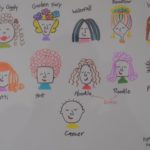Nutrition and wellness guide
Check out this great nutrition and wellness guide for children with cancer and their families, put together by Gabi from Jacob’s Heart and Stanford’s children’s hospital.

Check out this great nutrition and wellness guide for children with cancer and their families, put together by Gabi from Jacob’s Heart and Stanford’s children’s hospital.
I couldn’t get myself to go to work today. It was exactly 2 years ago when the phone rang at night, and the doctor broke the news that our then 5 year old was diagnosed with cancer. Everything changed overnight, and we were abruptly tossed into what seemed like the dark ages of the medical system. I can never forget the nightmares that followed…
Today, she’s still undergoing chemo treatment, but is smiling and closer to her normal self. What a relief, and heartfelt joy to be given a second chance at life!!
A huge THANK YOU to everyone that has helped us through this trying period! When something like cancer hits your child, it’s a long and difficult journey (2 years and still going), and takes every ounce of strength and positive energy to fight it. None of us has that superhuman strength — which is why we need the support of our friends, family and workplace.
As I look back, there were numerous times when I felt “low” or let down — by life, friends or workplace. Below are a few things that have helped so far (in no particular order):
Thanks to the above, and a wonderful set of friends and family, we’ve somehow managed 2 years of treatment, while minimizing unexpected hospitalizations and complications so far. And if we can, so can you! Wishing everyone the very best in your journeys!!
It’s heartbreaking to see kids struggle with cancer treatment and cope with the sudden disruption of their life. It is very challenging on every front — physically, emotionally and mentally. But it’s remarkable how resilient and graceful kids can be despite the chaos! So hang in there, all will be well… Here are some things that have helped our kid stay safe and positive through this trying period (sorry for the long post).
On the physical front:
On the mental / emotional front:
These are just some ideas that have worked for us. We are sure there are many more. Let us know what worked for you!
When kids are faced with a life threatening illness, it’s devastating for parents. Here are some things that have been helping us cope with our kid’s cancer treatment. (Often, kids are so resilient and graceful, that they cope faster and better than us, and inspire us with the necessary strength to march ahead!)
Medical front
Taking care of yourselves (Yes, it matters a lot!!)
Finding a good support network
This list is by no means complete. Hope you found a couple of useful things!
As parents, we found the following books to be quite informative and helpful.
Our kid loved these books, that gave hope and courage, while also being fun to read.
Losing hair can be quite hard for kids… especially for girls whose favorite princesses have long hair like Rapunzel… Few things that helped our 6 year old cope with hair loss:
– Seeing pics of kids (and adults) whose hair grows back after treatment was very helpful in assuring our kid that the hair loss was temporary, and that her hair would grow back nice and long after treatment…
– Make it memorable. We visited an upscale hair salon. I cut my hair by 15” and donated it to Wigs for kids, and said, “Mommy looks very different now, but I still love you the same.” Our kid felt more comfortable and agreed to get her hair cut. The rest of the week, she kept talking about how we donated our hair to help other kids get wigs. Made her feel like a lil’ hero!
– Watch movies and read books. We watched movies like Beauty and the Beast which reinforced the message that “Looks don’t matter, it’s the heart that matters”. Kids relate much better to princesses and superheroes and hearing from them is very reassuring…
– Time for fancy caps and wigs. We had many funny caps including a puppy, monkey, pig… Our favorite was the one we made with medical gloves and emoji during a hospital stay. We didn’t try wigs, but I’ve heard a lot of folks having fun with it too…
– It’s only natural for kids to miss their hair. Our lil’ one loved combing my hair. We bought her a couple of dolls with long hair and she loved combing them over and over again!
– Find ways to laugh! We discussed and drew various crazy hairdos that our kid would like to try when her hair starts growing again. Her favorite is waterfall and spaghetti. What’s yours? (Needless to say, we all unanimously *hate cancer*)

While it’s very hard initially, you will be amazed by how quickly kids accept their new look. They may be bald, yet they are beautiful, brave and kind…